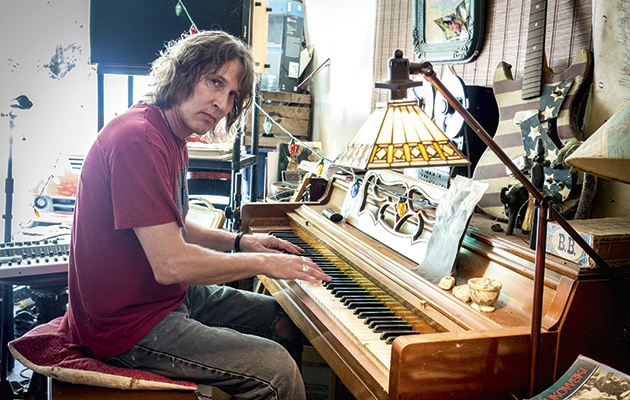Anyone whose musical tastes run to double malt woe with a longneck chaser will want to raise a glass to Available Light, the debut album by Indiana singer-songwriter, David Corley, who delivers many of its best songs in the downcast tones of a seen-it-all veteran of turbulent times exchanging bad lu...
Anyone whose musical tastes run to double malt woe with a longneck chaser will want to raise a glass to Available Light, the debut album by Indiana singer-songwriter, David Corley, who delivers many of its best songs in the downcast tones of a seen-it-all veteran of turbulent times exchanging bad luck stories in a bar whose other regulars include beer mat laureates like Mark Eitzel, Tom Waits, Willy Vlautin, John Murry, Mark Lanegan, and over there with his back to the wall, possibly scowling at the rest of the room, Lou Reed.
The latter, meaning Lou, is noticeably recalled on Available Light on “The Joke”, a song with a particularly bleak outlook, sung by Corley in a suitably sardonic growl over a crunching guitar riff whose two chord root was surely planted originally in something like “What’s Good” on Magic And Loss or “Dirty Blvd”, from New York. You can hear Lou again, perhaps less obviously, on “Easy Mistake”, a litany of bone-tired regret that recalls the haunted chambers and poignant languid drift of “Coney Island Baby”. It’s a desecrated hymn to friendship, old times, one or more lovers left behind, all that. “Even the colours we dreamed in fade,” Corley muses mournfully, in a voice that sounds like it once had a life of its own, riotously led, but exhausted now, battered, beaten, charred at the edges.
At 53, Corley clearly has a lot of rough road behind him, hard times and a lot of hurt endured along the way. By an account he gives me, he grew up in Lafayette, rural Indiana. He was turned on to music when his uncle gave him a Beatles songbook. Through his parents’ record collection, he then discovered Van Morrison, Neil Young and Dylan – “the icons,” as Corley describes them – who inspired the songs he was soon writing. Dropping out of college at 20, he roamed. He delivered trucks, repaired roofs, tended bars, lived for a time in a remote cabin in the mountains of Georgia, before returning to Lafayette to recover from a heart attack. He was playing there in a “weekend band” called Medicine Dog when in 2014 he met Canadian musician and producer Hugh Thomas Brown, who not much later was producing Available Light at his studio, a converted post office on an island south of Ontario.
As a teenager, Corley experienced the first of the ecstatic visions that have continued to visit him, unbidden, hard to explain. These “glimpses of the mystic”, as Corley describes them, find vivid expression in songs here like the album’s handsome title track, whose funky country rock cadences make it sound like something wonderful recorded in Nashville, at Elliot Mazer’s Quadrafonic Sound Studios, in about 1971, the chunky guitar lick that drives it bringing to mind “Heart Of Gold”. Elsewhere, the sense of speculative wonder that replaces the record’s prevailing disconsolation owes much to Van Morrison, especially on the long, ruminative “Beyond The Fences”, “Unspoken Thing” and especially the rhapsodic “Lean”.
The album’s closing tracks – “Neptune/Line You’re Leavin’ From”, “The End Of My Run” and “The Calm Revolution” – are, meanwhile, sad reflections on loss and an intemperate life that share with John Murry’s The Graceless Age an ominous fatalism. The pick of three excellent songs is “The End Of My Run”, nigh on seven minutes of self-recrimination, apology and defiant bravado. “I’m boxed up in this canyon, sometimes I wish they’d just bury me,” Corley sings, his voice framed by rolling piano lines, mournful backing vocals, weeping slide guitar lines. “I’m gonna make a play here,” he goes on, “come hell, high water or blood.”
The song’s final minutes are wounded, a stricken lament, heavy with regret. “Would I do it again, now that it’s all done?” Corley asks himself. “Oh man, that’s hard to say, just hard to say, so hard to say,” he confesses, sounding as weary as the world itself, a tired man with nowhere left to go.
Q&A
David Corley
Not many people release their debut album at 53. What took you so long?
You gotta live a life to write about it. You can’t make this stuff up. I’ve done my share of travelling around and I got lost in the world.
You’ve spent a long time on the road, then?
I wasn’t ever really on the road. I was just on the move. It was a hard life. I was writing and playing music constantly and I feel like I’m lucky as hell that life keeps happening in a beautiful way. But desperation sets in and I have to find a way to deal with both desperation and beauty. Everybody does.
What would you say are the recurring themes of your songs?
Fuckin’ up, mistakes, missteps and girls.
How would you describe Available Light to someone who hasn’t heard it?
I wanted to make a record that sounded like 70’s gold. You go through it and listen to it and there are no fillers. Every song is alone and in its own right, but they fit together. You know, I guess I wanted to liberate some of these songs from my journals and get ‘em in your ears. I want you to listen, and when it’s done say, ‘I gotta hear that again – what the fuck was that?’ And then I’ll disappear back into the woodwork.
INTERVIEW BY ALLAN JONES



